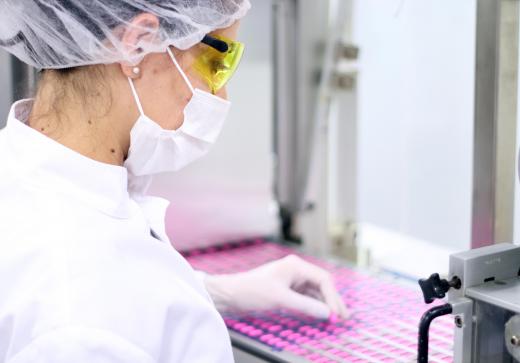The different methods of pharmaceutical quality control include, but are not limited to, inspections conducted by government agencies, the drafting and adherence of a detailed standard operating procedure (SOP), and periodic collecting and testing of products by employees of the company. Inspection of the facilities of pharmaceutical companies and product assays conducted by outside agencies are among the best quality control methods. Pharmaceutical quality control involves ensuring the cleanliness of facilities, the calibration and efficiency of laboratory equipment, the adherence of workers to procedures, and the degree of purity of ingredients.
One common method of pharmaceutical quality control is gas chromatography mass spectrometry. Gas chromatography mass spectrometry involves subjecting a mixture, such as a medication or drug, to a chemical analysis in which the unique signature and quantity of every substance in the drug is identified and displayed. This test will indicate exactly the quantity of the specific chemicals present in the product. While this is only one of the different methods of pharmaceutical quality control, gas chromatography mass spectrometry is highly accurate and relatively simple to do.

Companies that manufacture drugs for sale and distribution in the United States are subject to strict rules and procedures enforced by the Food and Drug Administration (FDA). Firms must register and list every active pharmaceutical ingredient in commercial distribution. Furthermore, the FDA requires pharmaceutical companies to control and monitor all possible means of contamination of the product, both microbial and chemical, in the SOP.

Employees working in the manufacture of pharmaceuticals must know and follow established laboratory guidelines as clearly spelled out the SOP. One of the most important of these is careful attention to the keeping of laboratory records and logs. These logs are carefully scrutinized during inspections. Employees are expected to have a working knowledge of all analytical procedures and to fully carry them out with fidelity. Hand washing and use of laboratory aprons and gloves would be typical procedures workers would be expected to follow to ensure quality control.

While many pharmaceutical companies have high standards of quality control and make every effort to supply an outstanding product, this is not always the case. The integrity of a pharmaceutical manufacturer is not a guarantee, and counterfeit drugs are manufactured and manage to be sold in reputable pharmacies. Inspectors are often backlogged and do not visit a company for months at a time, and companies with violations usually are fined and given warnings before being forced to close. It never hurts to ask your pharmacist which drug companies they order from, and then do a little research into the reputation of those companies before buying a medication.
